|
|
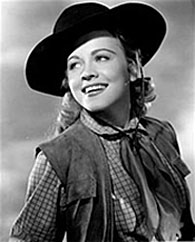 ANNE JEFFREYS ANNE JEFFREYS
by Bob Pontes and Boyd Magers
BP: What was your given name at birth?
AJ: Anne Jeffreys Carmichael. I was born in Goldsboro, NC, in 1923.
BP: What was your childhood like?
AJ: In spite of being a sickly child, it was most pleasant, due to a wonderful mother and superior grandparents.
BM: Hard to believe you were ever sickly. At 75 you look terrific.
AJ: Some people say ‘phooey’ to the golden years. But I say you can deter aging through diet, exercise and the right attitude. My mother started me on a lifetime routine of exercise, diet and vitamins. If you think young, dress youthfully, wear your hair in a becoming style, you can keep old age at bay. I also believe in living life by good thoughts—and in being kind to people.
BP: Why did you become an actress?
AJ: Mostly because my mother wanted a career in singing for me. Thank goodness she steered me on my path of destiny.My first film was a Buster Crabbe western. Then I went under contract to MGM and did “Tarzan’s New York Adventure” and “I Married an Angel” with my hero and heroine—Nelson Eddy and Jeanette McDonald. Then I went under contract to Republic and didn’t care for the roles of chorus girls or gangster molls they cast me in and requested to play a “nice girl role”—hence the Wild Bill Elliott series.
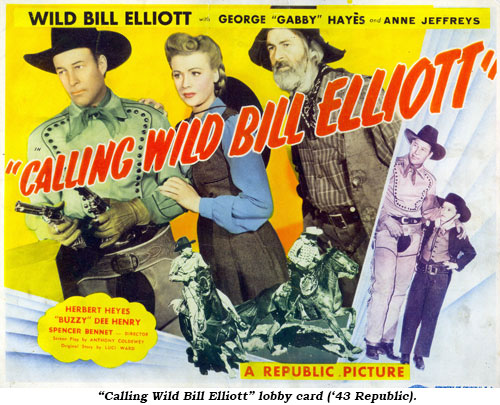
BM: Tell us your impressions of Bill.
AJ: A very nice gentleman. He was originally a dress extra and somebody talked him into doing the Red Ryder series—probably Pappy Yates who ran Republic. He was very tall—6'3", 6'4", and, of course, he had those boots, making him a giant. He was a man who knew what he wanted, smart business-wise. Everything was very well calculated and worked out in his career. He had it all planned what he was going to do and how he was going to do it. And he accomplished it. He became a big western star practically overnight. He was always sort of reserved and quiet, but fun…had a nice sense of humor. Of course, Gabby Hayes kept everything stirred up a bit. (Laughs) He was such a sweetheart. We had a lot of laughs together. I learned to steal scenes anyway I could because, usually, the girl in those things was very incidental. The back of my head was in most shots. I used to wear a bow ribbon in my hair, so I wiggled my bow ribbon, wiggled my ears…anything to throw them off and get a little action in the camera. Bill always appreciated it. During the series with Bill, I once had to play an Indian girl. (Laughs) They put a black wig on me, put dark makeup…‘course I had blue eyes. Put a headband around my forehead with a feather, buckskins and moccasins. The first day with all this getup on I went in the commissary and was at the counter when my agent came in and sat right down beside me. I thought—he doesn’t recognize me, so I didn’t say anything. We must have eaten lunch beside each other for 15-20 minutes until I finally said, “Could you pass the salt please?” He looked around and gasped—“Annie?” Another thing—the crew were great pranksters. They were mischievous. I was the only girl and we were working in a phony cave on the backlot. It was one of those hot, dusty days. My name in the film (“Wagon Tracks West”) was Moonhush. (Laughs) I was sitting in this canvas chair and did not see the cowboy sneak up behind me and tie my Indian fringe from my buckskins to the chair. Then someone hollered, “Annie, they want you over here. Hurry, hurry.” I got up and took the chair with me! Here I was walking along dragging the chair behind me tied to the fringe of my buckskin! Another joke they played on me…wearing these big old moccasins I was always slipping my feet out and putting on comfortable shoes. They took them one time, put them behind my chair, then hollered, “Come on Annie, they want you now. Put on your moccasins.” I jumped into my moccasins and, unknowingly, they had filled them with talcum powder. Every time I stepped, these big white puffs (Laughs) came flying all over the place. Whitecloud Moonhush they called me after that! Still another time, the Indians were in the cave supposedly drying fish over the fire and they had these smoked herring. Somebody took one of these smoked herring and put it in my Indian knapsack! It was a hot day and—phew, I couldn’t figure out where the fish was. They’re all walkin’ ‘round holding their noses—“Eeeuck—Annie!” It wasn’t until lunch when I took the knapsack off that I realized what they’d done. I took it and hid it in the prop box but didn’t tell the wranglers where I put it. I said, “I found the fish fellas…one of you has it in your knapsack.” They searched all day! “Annie—now this isn’t funny anymore, it’s real hot out here and that fish is smelling up something somewhere.” I said, “No, no, you’ve got to find it.” For three days I let that fish foul up the prop box. (Laughs) It was a lot of fun.
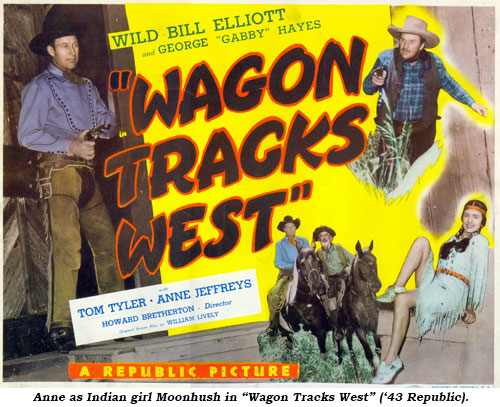
BP: You starred with Randolph Scott in “Return Of the Badmen” which had an all star cast. Of them all, who stands out in your mind?
AJ: Gabby was an old friend from Republic, and Randy Scott, a fellow North Carolinian, was a true gentleman; but Robert Ryan is the one I remember most vividly. He was a very intense actor and murdered my character in both “Trail Street” and “Return Of the Badmen”. He choked me to death in one and shot me in the back in the other. He seemed to enjoy it, so I was a little leery of him. (Laughs) However, he really was a very nice, warm person and a terrific actor.
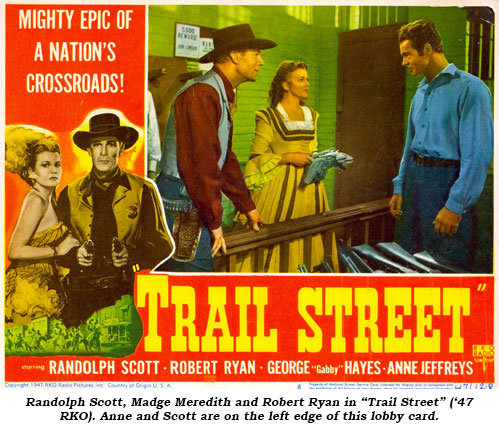
BP: What are the things you will always remember about making western films?
AJ: The dust and dirt—and reflectors blinding me.
BP: What were the differences you found between making a low budget western and a big budget western?
AJ: Mostly you had more rehearsal time. Basically, they were the same—same horses, same wranglers, a lot of the same locations and a lot of the same actors. I enjoyed “Nevada”. I liked working with Mitchum and I had a good role for a western. We worked on location, a beautiful spot near Mt. Whitney. We stayed in Lone Pine.
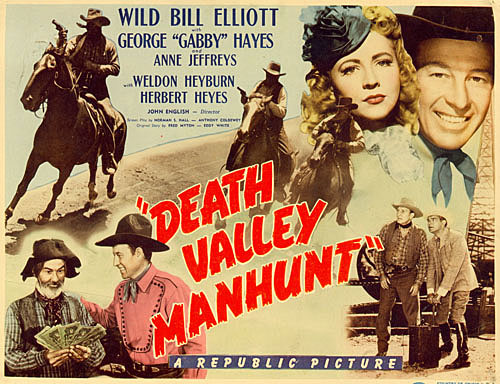
BP: What does being an actress mean to you?
AJ: All I desire—in my professional life. I hope to continue acting as long as God allows me to.
BP: What are the mistakes you made about your career?
AJ: Not being demanding enough or too choosy of my roles. I enjoyed acting, so I’d do any role the studio came up with.
BM: But best days of your life were on Broadway.
AJ: I did five Broadway shows. My first was “Street Scene”—opera really. I was under contract to RKO but fell in love with N.Y. theatre. Then I did an operetta written especially for me. I did “Kiss Me Kate” for two years, then “Three Wishes For Jamie”. After that “Kismet” with Alfred Drake at the Lincoln Center. I had about ten good years on Broadway, but kept going back to do films. When I left North Carolina, I studied music in N.Y. I was trained in opera and sang with the municipal opera company in N.Y. as a 15 year old. I’m proud of all my stage work which includes dozens of different shows, including “The King and I”, “Camelot”, “Sound of Music”, “Carousel”, “Destry” and “Bells Are Ringing”.
BP: Was “Topper” the only TV series you and your husband, Robert Sterling, made?
AJ: We followed it with “Love That Jill” which was about the high fashion world. It only ran one season. He’s done other series—“Ichabod and Me”, which he hated. I did “The Delphi Bureau” and one season on “Falcon Crest”. I was on “Finder of Lost Loves”, an ABC night time series. I had a running part on the daytime soap, “General Hospital”. My husband no longer acts. I’ve also been on “Baywatch” recently. I love to travel and have done a lot of it. I have a wonderful husband and three great sons, and, at present count, three darling grandchildren. God has blessed me!
At 94, Anne died in L.A. September 27, 2017.
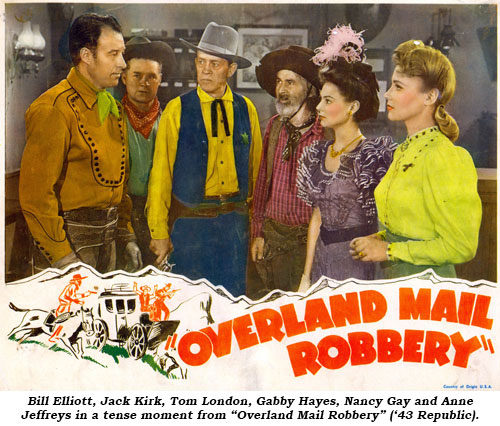
Anne’s Western Filmography
Movies: Billy the Kid Trapped (‘42 PRC)—Buster Crabbe; Calling Wild Bill Elliott (‘43 Republic)—Bill Elliott; Bordertown Gunfighters (‘43 Republic)—Bill Elliott; Man From Thunder River (‘43 Republic)—Bill Elliott; Wagon Tracks West (‘43 Republic)—Bill Elliott; Death Valley Manhunt (‘43 Republic)—Bill Elliott; Overland Mail Robbery (‘43 Republic)—Bill Elliott; Raiders of Sunset Pass (voice only) (‘43 Republic)—Eddie Dew; Hidden Valley Outlaws (‘44 Republic)—Bill Elliott; Mojave Firebrand (‘44 Republic)—Bill Elliott; Nevada (‘44 RKO)—Robert Mitchum; Trail Street (‘47 RKO)—Randolph Scott; Return Of the Badmen (‘48 RKO)—Randolph Scott. TV: Wagon Train: Julia Gage Story (‘57); Wagon Train: Mary Beckett Story (‘62); Bonanza: Unwrit ten Commandment (‘66).
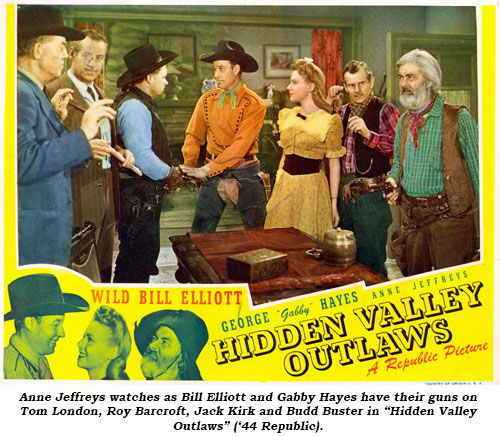
top of page |

